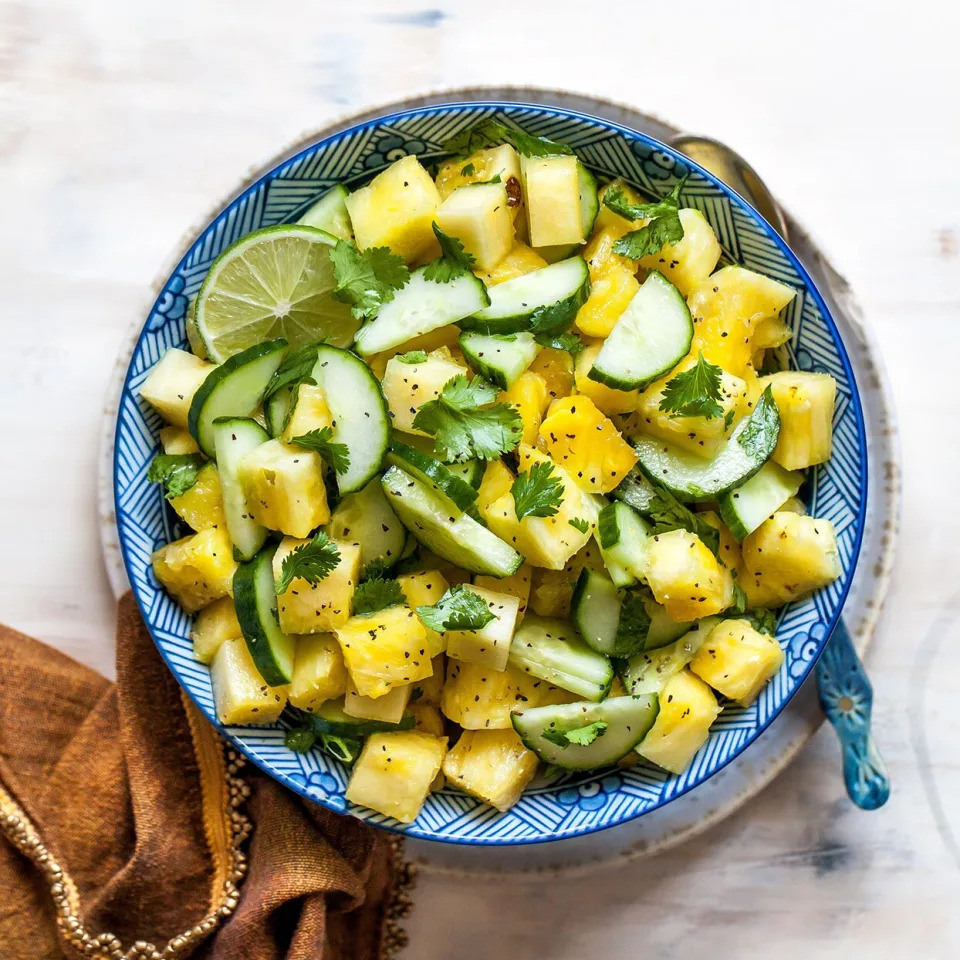EatingWell
Eating More Fruits and Veggies May Improve Your Memory—Here’s Why, According to New Research

Growing up, you were likely told more times than you can count to “Eat your veggies”—and for good reason. Fruits and vegetables are among the healthiest foods on the planet. They provide a wide variety of vitamins, minerals, fiber and other essential phytonutrients (like antioxidants) that are critical for good health and lowering your risk of developing chronic diseases, such as heart disease and cancer—the top two causes of death in the U.S.
Pictured Recipe: Pineapple & Cucumber Salad
While you probably know that fruits and vegetables are good for your body, you might be surprised to hear that they are also important for your brain, and that eating plenty of them may even improve your memory. According to a new study published on November 22, 2022, in Neurology, people who consume more foods high in antioxidant flavonols, which are abundant in several fruits and vegetables, may have a slower rate of memory decline. “Fruits and veggies’ high antioxidant levels, including polyphenols, flavonols and other bioactive compounds, lower inflammation in the body, which may contribute to memory decline,” says Dana Ellis Hunnes Ph.D., M.P.H., RD, a senior clinical dietitian at the Ronald Reagan UCLA Medical Center, assistant professor at UCLA’s Fielding School of Public Health and author of Recipe for Survival. “Additionally, these foods lower plaques in the brain due to their antioxidant properties and are beneficial for the microbiome, which we know is important for cognitive health.”
These findings are critical for public health, considering that the number of Americans with Alzheimer’s disease (the most common form of dementia) is expected to rise to 12.7 million by 2050. Keep reading to learn more.
Related: Why You Should Eat the Rainbow When It Comes to Fruits and Vegetables
What the Study Found
To arrive at these conclusions, researchers at Rush University Medical Center in Chicago followed 961 participants for an average of seven years. The subjects had an average age of 81 and did not have dementia at the study’s onset Each year, participants completed a food-frequency questionnaire regarding how often they ate certain foods. They were also given annual cognitive and memory tests and asked about various lifestyle factors, including their level of physical activity and how much time they spent doing mentally engaging activities like reading and playing games.
Researchers determined rates of cognitive decline using a global cognition score ranging from 0.5 (no cognitive impairment) to 0.2 (mild thinking problems) to -0.5 (Alzheimer’s disease). Participants with the highest flavonol intake experienced a decline rate that was 0.4 units per decade slower than the decline rate of those with the lowest intake. “It’s exciting that our study shows making specific diet choices may lead to a slower rate of cognitive decline,” said Thomas M. Holland, M.D., M.S., study co-author and medical advisor in the Department of Internal Medicine at Rush University in a press release. “Something as simple as eating more fruits and vegetables and drinking more tea is an easy way for people to take an active role in maintaining their brain health.”
What It Means
Researchers noted the slower rates of cognitive decline were likely due to flavonol’s high antioxidant and anti-inflammatory properties. They also determined that the best high-flavonol fruits and vegetables for brain health include apples, broccoli, kale, olive oil, oranges, pears, spinach and tomatoes. But numerous fruits and vegetables contain antioxidants and anti-inflammatory properties, so eating a variety is the best way to reap the benefits. “Typically, the darker the fruit or vegetable, the higher the flavonol content,” says Ellis Hunnes. “Berries are particularly high, as are dark leafy greens. Limited amounts of tea, coffee and red wine are also high in flavonols and can be beneficial for memory and overall health.”
The Bottom Line
A new study from Rush University Medical Center in Chicago found that higher consumption of fruits and vegetables rich in flavonol antioxidants may reduce rates of memory decline when combined with regular exercise and mentally stimulating activities. Additionally, eating plenty of these high-flavonol foods may help improve brain function, reduce rates of cognitive decline and lower risk of dementia. Consult your health care team about how to include more high-flavonol fruits and veggies in your diet to support your brain health.
Read Next: Best & Worst Foods for Brain Health, According to Dietitians
